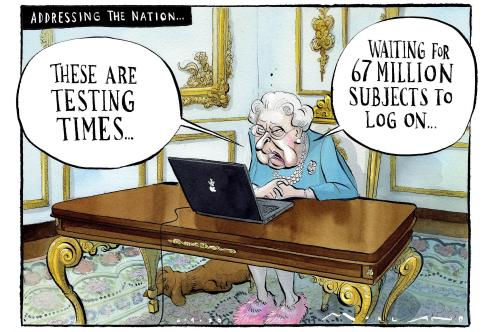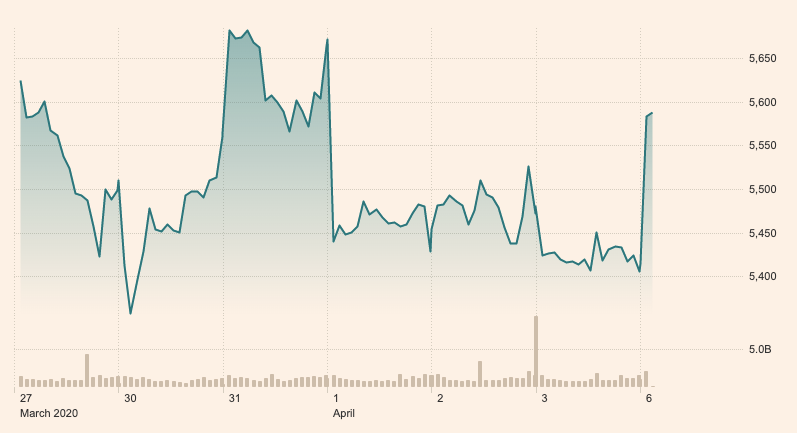- Charlotte Street Partners

- Apr 6, 2020
- 6 min read
A weekend to reflect
Written by Scarlett Regan, Researcher
Edited by Iain Gibson, Associate Partner
Good morning,
In the olden days of a few months ago, you would generally find the biggest news stories occurring during the week. This weekend, however, wasn’t exactly short of headlines, with the announcement of a new Labour Party leader, the health secretary threatening that outdoor exercise could be banned, the resignation of the Scottish chief medical officer, an almost unprecedented Queen’s address to the nation, and the prime minister admitted to hospital with coronavirus.
Our world is changing at a frightening speed, with many speculating if we will ever, or should ever, return to how it was before.
Most acutely, the crisis has confirmed to us all who is absolutely essential.
A video shared by BBC News struck me yesterday: a nurse, exhausted after a long shift, describing how difficult it is for NHS workers, putting themselves in danger “to try to save other people’s loved ones”. My aunt, who works in prosthetics, cheerfully spent her Saturday in hospital with colleagues, making protective visors from prosthetics materials.
Throughout the last few weeks, these NHS “health heroes”have headed up the frontline with immense bravery. There have sadly already been losses of life: a 24-year-old nursing assistant was one of yesterday's victims.Hundreds of thousands of health workers are still without sufficient protective equipment, risking their own lives and those of their families, every day. Some have even resorted to bin bags, plastic aprons and skiing goggles to protect themselves. The recommended two-metre distance for us is a mere 20cm for them. Estimates suggest that up to a quarter of NHS doctors and nurses are currently self-isolating, which puts increasing strain on those still working.
This crisis – and we might only be at its beginning – has revealed that the NHS is critically underfunded. For the last ten years, it has been denied a budget necessary for our ageing population.
The coronavirus hitting the UK has exposed many things. For one, it has confirmed who our key workers really are. All hail the bin collectors, the milk deliverers, the factory workers, the postmen and women, the care workers, the pharmacists, the supermarket staff, the cleaners. And, crucially, those fighting to save our lives. Echoing the words of newly elected Labour leader Keir Starmer, it has never been so obvious that our key workers are “overlooked and underpaid”.
Our health heroes need to be treated as heroes if we want to continue to rely on them. Funding the NHS better needs to be top of the agenda in the post-crisis world, if we have any hope of facing future crises with confidence.
And, unfortunately, that will take more than banging pans and clapping hands every Thursday evening.
News
Scotland’s chief medical officer Dr Catharine Calderwood has resigned, after making two weekend trips to her second home during the lockdown. This follows the Scottish Sun publishing photographs of her and her family in Earlsferry, Fife, this weekend. She issued an apology on Sunday morning and admitted it was a “mistake”, but yesterday evening this became a resignation statement, in which she said she was “deeply sorry”.
The National Domestic Abuse helpline has seen as 25 per cent increase in calls and online requests for help since the lockdown begun, the charity Refuge has said. Visits to the helpline website for information were 150 per cent higher than during the last week in February. This comes as campaigners warn that the lockdown restrictions could heighten domestic tensions and cut off vital escape routes.
Keir Starmer, the newly elected leader of the Opposition, has named his shadow front bench team. He has appointed Anneliese Dodds as shadow chancellor and Lisa Nandy has shadow foreign secretary. Former lawyer Nick Thomas-Symonds has been appointed shadow home secretary. Starmer has sacked several loyal supporters of Jeremy Corbyn, as his large victory on Saturday allows him to build a new team from scratch. (£)
Japan is expected to declare a state of emergency, with prime minister Shinzo Abe speaking to experts this afternoon. So far, Japan has 3,800 cases of coronavirus, and 85 reported deaths.
Business and economy
The new governor of the Bank of England, Andrew Bailey, wrote a significant op ed in the Financial Times over the weekend. In a move designed to clear up any confusion that the Bank may be making interventions that put its inflation target at risk, he ruled out the idea of using monetary financing to help contain the economic effects of coronavirus. We know from history that printing money into a crisis risks the ultimate pain of hyperinflation and high unemployment leading to a banking crisis and long-term recession. The Bank is clearly alive to these risks now. (£)
This week, Rolls-Royce will abandon targets on profits, cash and deliveries, and suspend its dividend for the first time since privatisation in 1987. The group builds engines for widebody aircraft such as the Airbus A350 and Boeing’s 787 Dreamliner, which have been grounded in recent weeks, with border closures and national lockdowns. The group is also aiming to announce new credit facilities to bolster liquidity, which was close to £7bn at the end of 2019. (£)
The Institute for Fiscal Studies (IFS) has warned that shutdowns caused by the coronavirus outbreak will have a disproportionate impact on the youngest and lowest paid workers and women.This is because the industries that have ground to a halt employ nearly a third of all UK employees under 25. Lowest paid workers will be badly affected, as they are seven times more likely than high earners to have worked in a sector that is now shut down. Women are a third more likely to work in these sectors than men.
New reports by the Centre for Economics and Business Research suggest that the coronavirus lockdown will cost the economy £2.5 billion a day for as long as it lasts, and that consumer confidence is down to its lowest level since the financial crisis. Their figures are in line with those put forward by other economists, who warn that the economy will shrink by 30 per cent in the second quarter of the year. (£)
Columns of note
In The Guardian, Nesrine Malik notes that after the crisis, we must remember that the NHS is not drained by migrants, but sustained by them. He tells the story of Sudanese Amged el-Hawrani, the second frontline doctor to die of the virus. These foreign-born NHS doctors and nurses are not exceptions, he notes, reminding us that 44 per cent of medical staff are BAME. Post-crisis, migrants working in the NHS must be considered vital members of the NHS community and valued as such.
In the Financial Times, Andrew Hill argues that CEOs must turn their coronavirus-prompted pay gestures into real reform. Ana Botín, chairman of Santander, has contributed half her pay to a medical equipment fund, but she is an anomaly here, with most doing the minimum necessary, he notes, including a “20 Per Cent Club” of bosses reducing their salaries by a fifth. If bosses follow up on their goodwill gestures after the crisis in addressing permanent pay reform, their reputation will not be damaged, he concludes. (£)

Source: The Times
Markets
What's happening this week?
Eurozone finance ministers are due to meet on Tuesday (via video) to organise how they will fund the measures planned to protect and restart the economy. This comes after the EU leaders summit on the 26th March did not provide a solution. There have been rising calls for eurozone governments to collectively issue “coronabonds”, a proposal backed by an alliance of nine member states but opposed by Austria, Finland Germany and the Netherlands. It is likely that they will discuss plans to raise funds for an €80bn to €100bn reinsurance scheme to support countries confronted by jobless claims.
Later in the week, there will be an Opec+ meeting, where oil ministers from Opec and countries that were part of the Opec+ alliance will discuss a deal to cut the global supply of crude. This will be in the form of an online conference. US president Donald Trump has said that a deal was imminent between Russia and Saudi Arabia, following a price war between the two members of the Opec+ group.
On Wednesday, the US Federal Reserve will release minutes from recent meetings, followed by the ECB on Thursday. The ECB’s recent measures include plans to buy €750bn in additional bonds to contain the financial fallout from the pandemic.
UK activity data for February will be released on Thursday, showing what state the economy was in pre-lockdown. Similarly, Germany, France and Italy will release industrial production data for February. Watch out for China and the US inflation figures, out on Friday.
Investors are looking forward to Tesco, Asos and Levi Strauss results this week.
What's happening today?
Finals
Global Yachting Group
M Winkworth
Mobile Tornado
AGMs
Rm
Final Dividend Payment Date
Ind.inv.tst
Int. Economic Announcements
(07:00) Factory Orders (GER)
(09:30) PMI Construction (US)

Did you know?
Baking yeast sales have increased six-fold from last year.
Parliamentary highlights
House of Commons
No business scheduled
House of Lords
No business scheduled
Scottish Parliament
No business scheduled

Comments